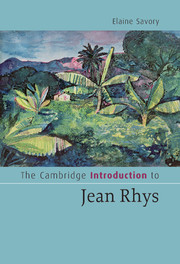Chapter 2 - Contexts
Published online by Cambridge University Press: 05 June 2012
Summary
Cultural identities
Rhys was culturally complex. She had a Caribbean upbringing and accepted her Celtic ancestry, but she resisted England (English and Anglo-Saxon were synonymous for her). Early direct experience of “this cold, dark country” was so unsettling that she found “my love and longing for books completely left me” (SP:90).
Her Welsh father's mother was known as “Irish Granny.” A picture of the Catholic Mary Queen of Scots hung over the sideboard in her Anglican parents' house in Roseau. But books popular in middle-class houses in England itself were displayed in her parents' glass-fronted bookcase, like the Encyclopaedia Britannica and poetry by English poets both major (Milton and Byron) and mid-level (Crabbe and Cowper) as well as the once-popular but now long-forgotten Felicia Hemans (1793–1835). There were wellknown novels that either spread colonial ideas (Robinson Crusoe, 1719, Treasure Island, 1883) or subtly critiqued them (Gulliver's Travels, 1726), or reinforced Christian ideals (Pilgrim's Progress, 1678). “Irish Granny” also sent fairy stories and Greek mythology to Rhys herself, who got into trouble with her severe nurse, Meta, for reading The Arabian Nights, even though it was an edition suitable for children (SP:17, 20–1).
Rhys also had a lifelong love for French literature and culture. Dominica has a strong French-derived cultural identity, as does nearby St Lucia, and neighbor islands Martinique and Guadaloupe are still part of France today. In her story, “The Day They Burned the Books,” the young narrator finds that Maupassant's Fort Comme La Mort “seemed dull” (CS:157) If she had not known French it would simply have been incomprehensible.
Information
- Type
- Chapter
- Information
- The Cambridge Introduction to Jean Rhys , pp. 12 - 24Publisher: Cambridge University PressPrint publication year: 2009
